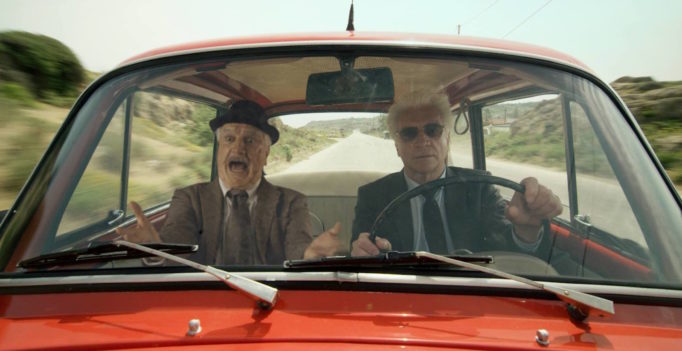Road to the Lemon Grove is at its best when it indulges fully in its love affair with Sicily. Montages of food in market stalls, picturesque coastlines, narrow streets, fruit trees, donkeys – these are the most pleasurable moments in the film. Unfortunately, they are all too frequently interrupted by a forced plot, underdeveloped characters, and an awkward premise.
Directed by Dale Hildebrand (cinematographer of festival favourite The Woman Who Loves Giraffes) and written by Hildebrand and Charly Chiarelli, Road to the Lemon Grove is the story of a Sicilian immigrant to Canada, Antonio (Chiarelli), and his son, Calogero (also Chiarelli). The plot itself is a bit unclear. Upon his death, Antionio is unable to enter heaven until he assists his estranged son. Initially, it is implied that Antionio must lead Calogero down a path to becoming a better person, but the audience is given no evidence to suggest that Calogero is a bad person to start with. Later, the task is to get Calogero to visit a lemon grove in Sicily to save it from being inherited by Antionio’s in-laws, or it might be to unite two feuding families. Why these families are feuding and what this has to do with Antonio’s admission to heaven is vague at best, but it doesn’t matter. This film isn’t so much about plot as it is about exaggeration – think big and loud. It’s the kind of comedy that can be described as “wacky”.
While I enjoyed the fast-paced, almost franticly surreal visuals, and the energy of Charly Chiarelli’s performance, Road to the Lemon Grove just wasn’t my cup of tea.
What is lacking throughout the film is consistency. The opening sequence of Antonio standing at the gates of heaven is a perfect example: the initial visuals are mesmerising and beautiful with an interesting play of light and colour, but this is almost immediately interrupted by an awkward verbal exchange between Antonio and God (voiced by Loreena McKennitt) that is thick with exposition. Moments like this one seem better suited to the stage than to the screen, and contribute to the almost dated feel of the film as a whole.
The romantic subplot with Calogero and the Sicilian actress Maria (played by Italian television personality Rossella Brescia) is also mildly infuriating. Though by no means the film’s weakest point, it still deserves criticism. The humour in the scenes with Maria consistently hinges on her objectification (at one point the audience is meant to laugh at a scene where the ghostly presence of Antonio grabs her ass) and indicates how far out of touch Hildebrand and Chiarelli may be with the current social climate. As the only female character to be given a major speaking part in the film, it would also be nice if she were given a personality and purpose beyond Calogero and his journey. Again, there is something very old fashioned about all of this and that might be what Hidebrand and Chiarelli were going for, but it ends up more cringeworthy than charming.
Overall, Road to the Lemon Grove is a frustrating film to watch. I wanted to like it much more than I did. Even now, I wish I could give Hildebrand’s movie more praise for its sometimes beautiful meditations on belonging and history; or for its illustration of a father-son relationship fractured by language and circumstance. Unfortunately, these are overshadowed by the film’s overall lack of coherence.
**********
Do You Tweet? Follow These Tweeple:
Shannon Page: @ShannonEvePage





Be the first to comment